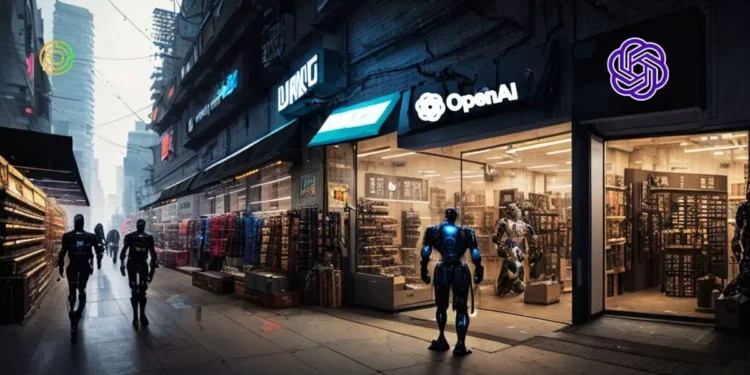In a groundbreaking move, OpenAI has officially announced the imminent launch of the GPT Store, revolutionizing the landscape of AI-driven conversations. Originally slated for release in November, the platform faced a delay of nearly two months, finally set to go live between January 8 and 14.
The Genesis of GPT Store
OpenAI’s initial revelation in early November outlined a centralized store for user-created GPTs on the ChatGPT platform. This innovative concept allowed users not only to craft their unique GPTs but also to monetize their creations. While the company initially projected a late November release, circumstances dictated otherwise, leading to subsequent postponements.
December brought further confirmation of a delay, pushing the much-anticipated launch into 2024. Now, OpenAI has notified users that the GPT Store will see the light of day next week, providing an avenue for creators to share, explore, and monetize their personalized GPTs.
Discover, Share, Monetize
Much like mobile app stores, the GPT Store aims to categorize and rank user-generated GPTs based on popularity. The email sent to creators succinctly outlined three essential steps for those planning to share their GPTs on the upcoming platform:
- Accept the Usage Policy and Brand Guidelines: Ensuring compliance with OpenAI’s standards.
- Verify Creator Profile: Complete the necessary profile details within user settings.
- Publish Publicly: Share GPTs openly, fostering accessibility and visibility.
Interestingly, brand usage guidelines specify that creations stemming from the platform are always made “with” OpenAI, not “by” OpenAI. This distinction, down to language nuances, reinforces the collaborative nature of the AI creations.
GPTs: ChatGPT’s Latest Marvel
GPTs, the latest addition to the ChatGPT repertoire, empower users to create bot versions tailored to specific tasks, complete with instructions, context, and supplementary files. Whether correcting texts, translating, addressing programming queries, or even serving as a Mathematics tutor, the possibilities are vast.
With the impending GPT Store, users gain a centralized hub to explore and leverage the diverse array of GPTs crafted by fellow creators, along with the opportunity to monetize their own contributions. The journey to this point has been fraught with unexpected twists, making the store’s arrival all the more intriguing.
OpenAI’s Ambitious GPT Store: Akin to App Store Excellence
Sam Altman, at the forefront of OpenAI’s endeavors, envisions the GPT Store as a pinnacle in AI application distribution. Developers can create customized versions of ChatGPT, potentially unlocking new revenue streams through their creations.
See also: ChatGPT Access for Less: Unlocking the Power of AI on a Budget
The Evolution of AI App Stores
In a world saturated with app stores on smartphones, computers, and various devices, OpenAI introduces the GPT Store as a novel player in the field. Notable entities like App Store, Play Store, and Microsoft Store have become integral to our daily lives, facilitating the discovery and download of applications tailored to specific needs.
GPT Store: A Paradigm Shift
OpenAI’s Monday announcement marked a significant stride in the AI domain. The company, led by Sam Altman, launched ChatGPT in November 2022, and now it allows users to craft diverse versions of the bot. Altman emphasized that this move addresses user feedback calling for enhanced conversational bot customization.
While ChatGPT is an extensive and capable system in its own right, tailoring the bot’s behavior for specific outcomes requires considerable time and effort. The tide is turning as users gain the ability to create personalized ChatGPTs, aptly named GPTs, for distinct tasks. Examples include Tech Advisor, a bot aiding in computer troubleshooting, and Sticker Whiz, transforming ideas into stickers.
Users, armed with creativity, are expected to flood the GPT Store with a myriad of options, removing the necessity for being a prompt engineer to maximize the model’s potential. As of now, anyone can create their personalized ChatGPT at chat.openai.com/create, sans programming knowledge, relying solely on prompting skill and possessing ChatGPT Plus or ChatGPT Enterprise.
GPT Store: More than a Distribution Platform
Unlike traditional app distribution systems, OpenAI envisions the GPT Store as a comprehensive solution. The store boasts a robust search system, allowing users to discover various GPTs, complemented by a ranking system highlighting the best ones. Categories spanning productivity, education, entertainment, and more ensure a tailored experience for users. Importantly, developers can monetize their contributions, aligning the GPT Store with renowned app marketplaces.
See also: Unleashing Creativity: The Complete Unity/Unreal/Godot ChatGPT AI Development Bundle
Conclusion
In conclusion, OpenAI’s announcement of the GPT Store marks a paradigm shift in the realm of AI conversations and applications. With a launch window set for January 8 to 14, users anticipate exploring a dynamic marketplace of customized ChatGPTs, contributing to the ever-expanding landscape of AI creativity.
FAQs
1. What is the GPT Store?
The GPT Store is a revolutionary platform by OpenAI that allows users to create, share, and monetize their personalized ChatGPT models. It serves as a central hub for exploring and accessing a diverse array of user-generated GPTs.
2. When is the GPT Store Launching?
The GPT Store is set to launch between January 8 and 14, providing users with an exciting opportunity to engage with customized ChatGPT models.
3. How Can I Share My GPT on the Store?
To share your GPT on the store, follow these steps:
- Accept the Usage Policy and Brand Guidelines.
- Verify your creator profile within user settings.
- Publish your GPT publicly, ensuring accessibility.
4. Can I Monetize My GPT Creations?
Yes, creators can monetize their GPTs through the GPT Store. OpenAI envisions this platform as a marketplace where developers can earn revenue from their innovative contributions.
5. What Are GPTs in the Context of ChatGPT?
GPTs (Generative Pre-trained Transformers) are a recent addition to ChatGPT, enabling users to create bot versions tailored for specific tasks. These can range from text correction to translation, programming assistance, and more.
6. Do I Need Programming Knowledge to Create a GPT?
No, programming knowledge is not mandatory. OpenAI has made it accessible for users to create their personalized ChatGPTs at chat.openai.com/create, requiring only prompting skills and a ChatGPT Plus or ChatGPT Enterprise subscription.
7. How Is GPT Store Different from Traditional App Stores?
Unlike traditional app distribution platforms, the GPT Store offers a comprehensive solution. It includes a robust search system, ranking for GPTs, and categories such as productivity, education, and entertainment. Developers can also earn money through the platform.
8. What Makes GPT Store a Game-Changer?
The GPT Store transforms the landscape of AI applications by empowering users to unleash their creativity. It brings a new level of customization to ChatGPT, fostering a dynamic marketplace of user-generated GPTs.
9. Are There Guidelines for Using OpenAI’s Brand?
Yes, creators are required to adhere to OpenAI’s brand usage guidelines. Notably, creations are to be attributed as “made with” OpenAI, emphasizing the collaborative nature of the platform.
Explore the possibilities with the GPT Store and elevate your ChatGPT experience. If you have additional questions, feel free to reach out to OpenAI’s support for further assistance.
Follow us on our social networks and keep up to date with everything that happens in the Metaverse!
Twitter Linkedin Facebook Telegram Instagram Google News Amazon Store
Recent Posts
- OpenAI Unveils SearchGPT: A New AI-Powered Search Engine
- Blockchain and Bitcoin: The Revolution in Online Casinos
- Dotcoin Tap-to-Play Game Set to Launch on Venom
- Look North World Secures $4.5M in Seed Funding, Partners with Gaming Giants
- Nexabot AI Launches AI-Powered Crypto Trading Bot for Cronos EVM Users












































